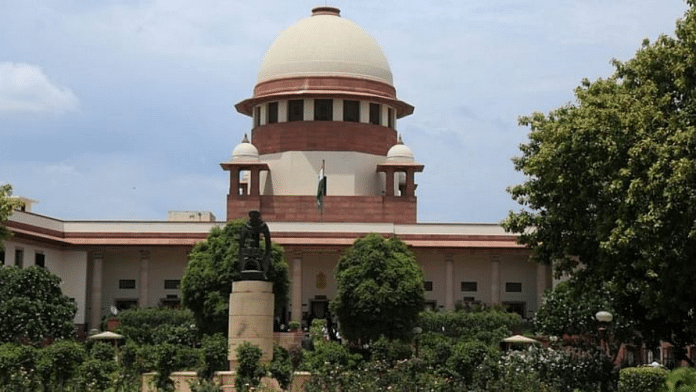New Delhi: The role of the lieutenant governor (LG) as an administrator under the Delhi Municipal Corporation (DMC) Act is not a “mirror-image” of what is provided under the Government of National Capital Territory of Delhi (GNCTD Act), or Article 239AA of the Constitution, Supreme Court was told Tuesday.
Defending his decision to nominate 10 aldermen in the Delhi municipal corporation, the LG’s office, in an affidavit submitted to a Supreme Court bench led by Chief Justice of India D.Y. Chandrachud, claimed that the entire ambit of local self-government by a municipal corporation is discussed in various provisions of Article 243 of the Constitution.
This independent mechanism of self-governance is “separate and distinct” from the framework of the GNCTD Act, the affidavit said.
The LG’s affidavit was in response to the AAP-led Delhi government’s petition to quash the former’s notifications of 3 and 4 January, 2023, to nominate the aldermen.
The affidavit, placed before the top court by additional solicitor general Sanjay Jain appearing for the LG, asserted that there is no concept of ‘aid and advice’ under the DMC Act and that this is relevant only in the context of Article 239AA. The governance of Delhi under Article 239AA is not a factor of governance of municipal corporations.
According to the affidavit, as far as the MCD is concerned, it has a multi-layered source of exercise of powers, such as the LG, the Delhi government, the central government and the commissioner appointed under the DMC Act.
Hence, the spheres of authority for the elected government of Delhi and the LG have been specifically delineated under the DMC Act, it said.
The discretionary power of the administrator or the LG under the DMC Act is independent, without any interference from other sources of authority. And this includes the power to nominate the aldermen, which the MCD Act recognises as an exclusive discretionary power conferred on the LG, the affidavit claimed.
After hearing Jain and the Delhi government’s counsel, senior advocate Abhishek Manu Singhvi, the SC bench deferred the matter to Wednesday. The judges said they would read LG’s response and then continue with the hearing.
Also Read: Digitising over 3,000 cr records, pushing online hearings — Modi govt’s plan for eCourts Phase III
Delhi government vs LG
According to the Delhi government’s petition, the LG can appoint nominated members to the MCD only with the aid and advice of the council of ministers, which was not done in the present case.
However, the LG’s response said that under the DMC Act, there is no provision requiring the administrator to seek or act upon the aid and advice of the council of ministers of the Delhi government while nominating aldermen.
The LG, as an administrator in the DMC Act, is a source of authority for the MCD, which is distinct from the central government or Delhi government, the affidavit said.
To buttress the contention, LG’s affidavit gives a brief background on the inclusion of Part IXA of the Constitution that paved the way for the creation of urban local bodies and municipalities as units of “self-governance” with their own independent mechanism for aspects of governance, including composition, taxation, audits and finances.
Both the GNCTD and DMC Act are parliamentary legislations and the same being mutually exclusive and not overlapping need to be interpreted within the domain of their respective statutory framework, the affidavit said.
Though both — the assembly and council — are elected bodies, they are governed by a separate hierarchy of exercise of power, it added.
Meanwhile, the LG also raised a question about the maintainability of the petition under Article 32.
He said the AAP government’s petition gives a “go-by to settle principles of constitutional jurisdiction laid down by this court, which prescribes that Article 32 can only be invoked in matters that concern enforcement of Part-III of the Constitution (Fundamental Rights), and not any other right.”
The petition does not indicate any violation of any fundamental rights, the affidavit said.
(Edited by Richa Mishra)
Also Read: Central ministries biggest litigants in govt with 2.85 lakh pending cases, finance tops list



